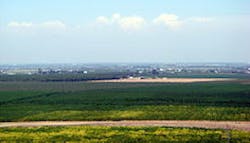CA Central Valley Board Approves Fines for Discharging Irrigated Land Waste Without a Permit
The Central Valley Regional Water Quality Control Board has issued Administrative Civil Liability Orders against Merced and Madera county landowners for failure to acquire the required permits for the discharge of waste from irrigated cropland.
Larry and Shireen Slate of Merced County were fined $32,032, and the David and Linda Davis Trust of Madera County was fined $9,152.
The landowners were issued directives to obtain regulatory coverage for their irrigated lands, and failed to respond to several notices to do so. The croplands subject to the fines are located in the eastern San Joaquin River Watershed.
State water quality law requires an owner or operator of a facility who discharges waste to get a water quality permit (called waste discharge requirements). Because pesticides and fertilizers used on cropland can run off into streams, or seep into groundwater sources, these permits ensure waste discharges don’t harm the Central Valley’s groundwater aquifers and rivers.
In December 2012, the Central Valley Water Board issued waste discharge requirements that allowed farmers in the eastern San Joaquin River Watershed to join a coalition of growers called the East San Joaquin Water Quality Coalition. The coalition conducts monitoring and provides reports to the Central Valley Water Board on behalf of the growers. Growers who don’t join the coalition incur much higher costs associated with conducting their own individual monitoring and reporting directly to the Central Valley Water Board. Landowners whose parcels do not have the required permit are subject to fines and may lose their opportunity to be regulated under the coalition-based permit.
“Our board provided growers with a very cost effective option for getting the regulatory coverage required by law by joining the coalition,” said Andrew Altevogt, assistant executive officer for the Central Valley Water Board. “The vast majority of growers have complied. For those who are trying to avoid these requirements, we have an aggressive program to identify their lands and, if necessary, issue fines to bring them into compliance. Through these fines, the board is clearly signaling that there is a steep price to pay for ignoring these basic regulatory requirements, and there is no economic advantage to delaying compliance.”
For more information, please review the Slate Administrative Civil Liability Order here; and the Davis Trust Stipulated Order is available for review here.
Landowners of irrigated cropland can find out how to join a coalition group and get the required regulatory coverage by going to the Irrigated Lands Regulatory Program join a coalition webpage, or by calling the Irrigated Lands Regulatory Program at (916) 464-4611.
More information about these fines can be found at the Irrigated Lands Regulatory Program Compliance and Outreach Activities page.


